- Home
- Malorie Blackman
Cloud Busting Page 3
Cloud Busting Read online
Page 3
‘It was only a joke, sir,’
Said Alex. ‘I only meant it as a joke.’
And he started to cry.
Great, big, rolling tears as he watched Davey.
‘Lucy, run to the office
And tell them to phone
For an ambulance,’
said Mr Mackie. ‘And
For God’s sake – hurry.’
I turned to Alex
And saw myself
And hated what I saw.
I hated Alex so much.
But I hated myself more.
And Davey’s eyes were on me.
Still watching me.
Still.
FINE
Davey was Ok.
The pen Mr Mackie
Jabbed into his leg
Was a special pen
Full of adrenalin.
It did the trick.
By the time
The ambulance arrived
Davey was no longer
Unconscious.
He said he was OK.
‘I’m fine, Mr Mackie.
I’m fine.’
But his face was still red,
And his lips were swollen
And he couldn’t stand up
And he kept scratching his skin.
Mr Mackie
Insisted that he went
To the hospital.
Davey’s mum was going
To meet him there.
As the school secretary
Helped Davey out
Of the classroom,
Mr Mackie closed the door
And turned to me
And said, ‘Sam, tell me
Exactly what’s been going on.
NOW.’
So I did. Every detail.
Mr Mackie picked up
Alex’s sandwich
From the floor
Where it’d fallen
And opened it.
One more peanut
Sat in amongst
The crisps
On the other side
Of the sandwich.
Mr Mackie was so angry.
Alex was still crying.
Mr Mackie took Alex out
To see the Head.
Whilst he was gone
I turned around
And everyone was looking at me,
Eyes on me again.
‘It wasn’t my fault,’
I whispered helplessly,
Hopelessly.
‘If I knew what Alex was up to
I’d have stopped him.’
A few eyes turned away at that
In disgust? In disbelief?
Why didn’t anyone believe me?
Davey was my friend.
I wouldn’t’ve let Alex do it.
But no one knew Davey was my friend
Because I didn’t want anyone to know.
They thought I was with Alex.
Like Alex.
Another Alex.
No, they thought I was Sam.
Worse than Alex.
And they were all right.
I was worse because
I was a coward.
Davey could be my friend
As long as no one found out.
As long as no one knew.
Just him and me.
Just me and him.
Davey, just you and me.
Me and you.
A secret to be shared by two.
I ran from the room
I escaped to the toilets
I locked the door
And lowered the lid
And sat down
And looked down at my shoes
And watched the water
Fall from my eyes,
Escape from my eyes
Flee, break free and
Drop from my eyes.
Splash onto my trainers
Splish, splash,
Spatter, splatter.
HOW COULD YOU?
Davey’s mum refused
To let her son come
Back to a school
Where anyone could do that
To her boy.
Davey’s mum said
She’d have to be dead,
Before her son
Came back to a school
Where anyone could do that
To her boy.
Davey’s mum was more
Than ready, willing and able
To move house if she had to
To move cities if she had to
To move abroad if she had to
Before her son
Came back to a school
Where anyone could do that
To her boy.
DAVEY’S GONE
I went to visit Davey in hospital.
I took him some grapes
And a couple of Spiderman comics
And my favourite science fiction book
That I didn’t lend to anyone
Except good friends,
Best friends.
I went with my mum to the hospital.
Mum chatted to Davey’s mum
Whilst Davey sat up in bed
Eating the grapes
And eyeing the comics
And flicking through the pages
Of my science fiction book
That I didn’t lend to anyone
Except good friends,
Best friends.
Davey’s mum had calmed down by now
Besides, Davey wanted to stay at school,
He didn’t want to move to another one.
‘Why not?’ asked his mum.
‘Because,’ was all Davey would say.
‘Because isn’t a reason,’ said his mum.
Davey shrugged. He’d said everything
He wanted to say. No more. No less.
He looked at me. And there were no sparkles
Or smiles or sideways thoughts in his eyes.
He looked at me, the way everyone else
Looked at me. No more. No less.
‘What d’you think of these curtains, Davey?’
I asked desperately. Where had the old Davey
Gone? ‘They’re OK,’ shrugged Davey.
OK? They were more than OK.
The hospital curtains around his bed were
Swirls of living colour, shouting scarlets,
Yelling yellows, booming blues, gargling greens.
Up and down and round and round
Dancing, melting, merging around each other.
Hipping, hopping, tapping, bopping
Alive.
‘They’re OK,’ Davey said again.
Where had the old Davey gone?
OK
I knocked for Davey today.
‘Wanna go to the park?’ I said.
‘OK,’ he nodded.
OK … I don’t like that word.
We walked to the park in silence.
‘How’re you feeling?’ I said.
‘OK,’ he shrugged.
There was that word again.
The park wasn’t too busy.
‘Fancy a game of football?’ I asked.
‘OK,’ he replied.
That word again and again.
I glanced around.
Find something quick.
‘Or would you rather muck around
In the adventure playground?’
‘Fine. OK,’ said Davey.
‘No, it’s not OK!’ I shouted.
‘Stop saying that word.
I hate that word.’
‘What d’you want me to say?’
asked Davey.
‘I don’t care. As long as it’s
Not OK!’ I barked at him.
‘And what’s wrong with OK?’
asked Davey.
‘It’s boring. It’s nothing.
It’s not you,’ I tried to explain.
But the words in my head
Didn’t make any sense.
Excep
t that Davey wasn’t OK.
So why say the word?
‘But this is what my mum wants,
And this is what you want,
And this is what the whole world wants.
I’m the same as everyone else,’
Said Davey. ‘I’m OK.’
CLOUD BUSTING
Davey turned and walked away.
‘Where’re you going?’ I asked.
‘Home,’ Davey replied.
‘I don’t belong here.’
And as I watched him go
I felt like I was letting
Liquid sunshine trickle
Through my fingers.
I wanted to call him back
But I knew he wouldn’t come.
I checked the grass for glass
And other nasty things.
And when I found a patch
Of grass and nothing else
I sat down and thought.
Then lay down with my eyes closed.
When I opened my eyes,
Clouds filled them.
Clouds so near
I could almost reach out
And touch them.
Time to go cloud busting.
Two was better than one
But one would have to do.
Cloud busting
Staring upwards
Letting the clouds
Fill, not just my eyes
But my ears and my mouth
And my nose. Touching
The clouds. Breathing them,
Sensing them. Being them.
Davey taught me how to do that.
WHAT SHOULD’VE HAPPENED
So I pointed straight up.
‘You look like a rabbit
With long, fluffy ears.
And you’re a cow’s head
Winking at me.
And you …’
‘That one doesn’t look anything like
A cow’s head!’ said Davey.
He’d come back.
He lay down beside me.
‘That one looks like
A table with two vases on it.’
‘Don’t talk wet! It’s a cow’s head.’
‘A table.’
‘A cow’s head.’
‘A table.’
‘You need glasses,’ I told him.
‘I invented cloud busting,’
Said Davey. ‘So what I say goes.’
‘But you’re not the only one
With an imagination,’ I replied.
‘You two OK?’ asked a woman
Walking by.
‘No, we’re better than OK,’ I told her.
‘We’re fantastic.’
‘We’re terrific.’
‘We’re tremendous.’
‘We’re stupendous.’
‘The grass is wet
We may be rusting
But we’re having fun
Cloud busting.’
The woman gave us a funny look
And walked off.
And Davey and I looked at each other
And burst out laughing.
‘And we’re best friends,’
I shouted after her.
‘Secret best friends,’ Davey said,
His smile fading.
‘Not any more,’ I told him.
I stood up and shouted
With all the breath in my body
And all the power in my throat,
‘Dave is my best friend.
So what d’you think of that then?’
‘Good for you!’ An old man
Shouted back at us.
WHAT DID HAPPEN
I lay still, cloud busting.
On my own.
Myself.
Alone.
Me.
I.
AFTER
Davey and I still spoke
Still walked to school
Still played together sometimes
But it was never the same.
He was one of them now.
The same as Alex,
Pete, Barry. He talked
About football and sport.
He played computer games
And read the occasional book.
But any music he didn’t like
Was a waste of energy.
And any book he didn’t read
Was a waste of time.
And any person he didn’t like
Was a waste of space.
He started hanging out with
Alex and the others,
Like a loose-fitting shirt.
Not one of them
But not so apart any more.
Not like me.
And Alex allowed this.
Like a kindly king,
So everyone said.
Like a guilty king
Ashamed and wary,
I thought, my thoughts my own.
Alex was showing the world
He could be generous
He could be noble
He could be better than me.
Davey started hanging out
With Alex and the others.
The ones who used to hang around
With me – a lifetime ago.
And everyone forgot
About Alex and the peanut
But no one forgot
About Davey and me.
AWAY
Davey became me.
And I became him.
I look at the summer sky
And see the bottom of
Heaven’s ocean.
I look at a tree
And stand and stare
As the branches
Like arms
Beckon me near.
I look up at the stars
And see holes in
The floor of heaven.
A light so bright
It burns my heart.
I look at people’s faces
And see myself in their
Selections of expressions.
Reflections.
Contact.
And my friends drifted away
Walked away
Ran away – including Dave –
Because I wasn’t Sam
Any more.
Davey left school
Six months after his
Allergic reaction.
His mum got a better job
In another town.
Davey didn’t tell anyone,
He just left.
One week he was there
The next week
He was gone.
And he never said goodbye.
Not to me.
Not to anyone.
He just left.
But he’d already gone.
HOMEWORK
So there you have it, Mr Mackie.
This is my homework
About my best friend, Davey
Who used to be called Fizzy Feet.
And how he went away.
But he left something behind
A thought, a feeling, an idea,
A different way to look at the world.
He left something behind, Mr Mackie.
He left me.
And I’m not Davey as he was.
And I’m not Sam as I was.
I’m Sam here and now.
And I hold out my hands every day
And spin round and round and say,
Isn’t life cherry ice cream with chunky chocolate chips?
Isn’t life a theme park, a rolling, rip-roaring rollercoaster ride?
Isn’t life all the shades of the rainbow seeping through every pore?
Isn’t life roast lamb and Mum’s rice with slices of cucumber on the side?
Isn’t life pop music, class music, a box of paints and a world through each door?
Isn’t life a burst of light, a scent to delight, a phoenix rising, dazzling in the night?
Isn’t life a magnificent mountain peak or silent woods or warm waves lapping a sandy shore?
/>
Isn’t life anything, everything you make it and then much, much, so much, oh much, more?
A NOTE FROM THE AUTHOR
I started writing poems for my own amusement long before I began to write stories. Nursery rhymes, playground songs and pop songs were as much a part of my life as breathing. I was reading at an early age, but this was a deliberate, though fun activity. Reading was something I had to be taught, something I had to sit down and do. Poetry was different. Poetry for me was in the way the branches of a tree danced in the wind, in the way snow fell to the ground bringing silence with it, in running water, in smiles, in music, in skipping songs, in insults, in chants – poetry was everywhere.
In Cloud Busting, I used many different forms of poetry as inspiration – haikus, blank verse, limericks, a shape poem. I hasten to add that these were used for inspiration – I didn’t stick rigidly to their forms (which are discussed below in more detail). I wanted most of the poems in Cloud Busting to be free-form and fluid. I wanted it to sound as if you’re really inside the head of Sam, who is telling the story in his own way, without worrying about whether or not his poems conform to a particular style or rhyme.
HAIKUS
Haikus traditionally have seventeen syllables. They are set out in three lines, the first with five syllables, the second with seven, the third with five. Chapter 3 is told entirely in haikus. Strictly speaking, haikus should include a seasonal theme and capture a moment in nature or time. Traditionally, haikus are used for learning and teaching, especially in Zen Buddhism. My verses in Chapter 3 are not strict haikus because some of my sentences follow on and they shouldn’t!
LIMERICKS
A limerick is a poem of five lines. The rhyming scheme is a-a-b-b-a. Lines one, two and five have seven to ten syllables and lines three and four have five to seven syllables. In Chapter 5, once again, I don’t stick rigidly to the limerick syllable structure.
BLANK VERSE
Chapter 7 is based on blank verse, i.e. unrhymed five-stress lines (iambic pentameters). What that means is each line has ten syllables, which can be split into five pairs with the rhythm, dee-dum, dee-dum, dee-dum, dee-dum, dee-dum. It’s said to be the nearest verse form to the rhythms of speech.
SHAPE POEMS
I love shape poems. They’re about fitting words not just to a shape but to a relevant meaning as well. There’s not much point in writing a poem about a dog and shaping it like a pineapple – unless, of course, that’s the point of the poem!
TITLES
In Cloud Busting, I use each chapter title as part of the meaning of the chapter. I wanted to make every word count.
I hope you like Cloud Busting. Perhaps it will inspire you to write your own poems.
ABOUT THE AUTHOR
MALORIE BLACKMAN is acknowledged as one of today’s most imaginative and convincing writers for young readers. Her book Noughts & Crosses has won several prizes, including the Children’s Book Award. Malorie is also the only author to have won the Young Telegraph/Gimme 5 Award twice with Hacker and Thief! Her work has appeared on screen, with Pig-Heart Boy, which was shortlisted for the Carnegie Medal, being adapted into a BAFTA-award-winning TV serial. Malorie has also written a number of titles for younger readers.

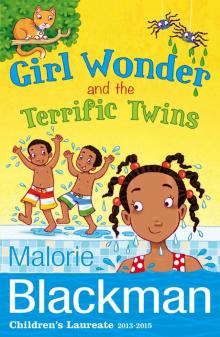 Girl Wonder and the Terrific Twins
Girl Wonder and the Terrific Twins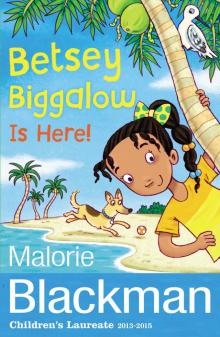 Betsey Biggalow Is Here!
Betsey Biggalow Is Here!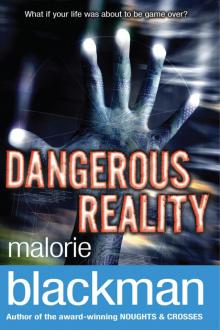 Dangerous Reality
Dangerous Reality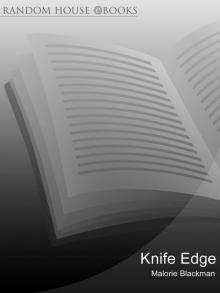 Knife Edge
Knife Edge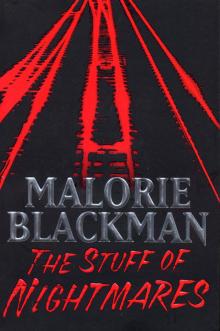 The Stuff of Nightmares
The Stuff of Nightmares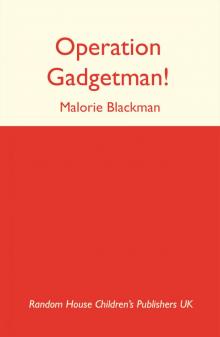 Operation Gadgetman!
Operation Gadgetman! Checkmate
Checkmate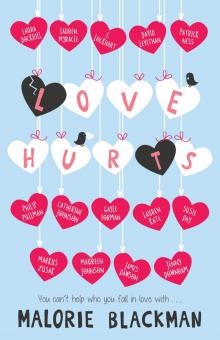 Love Hurts
Love Hurts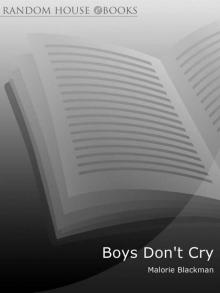 Boys Don't Cry
Boys Don't Cry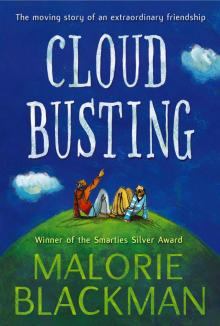 Cloud Busting
Cloud Busting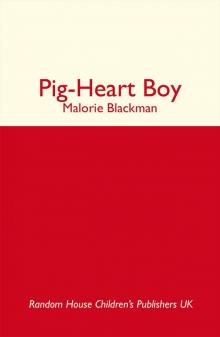 Pig-Heart Boy
Pig-Heart Boy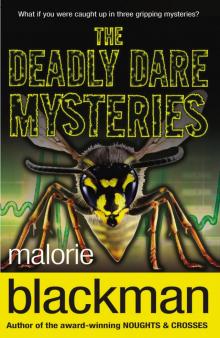 The Deadly Dare Mysteries
The Deadly Dare Mysteries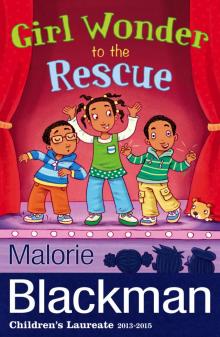 Girl Wonder to the Rescue
Girl Wonder to the Rescue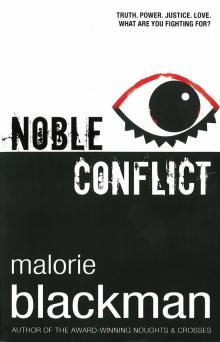 Noble Conflict
Noble Conflict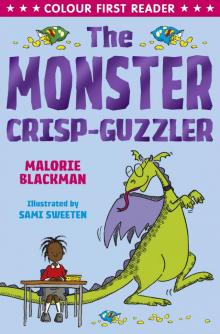 The Monster Crisp-Guzzler
The Monster Crisp-Guzzler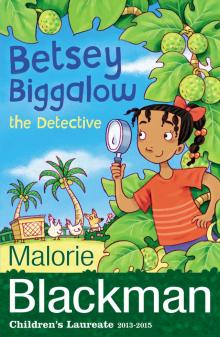 Betsey Biggalow the Detective
Betsey Biggalow the Detective Trust Me
Trust Me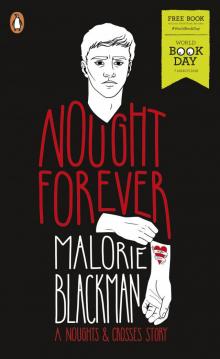 Nought Forever
Nought Forever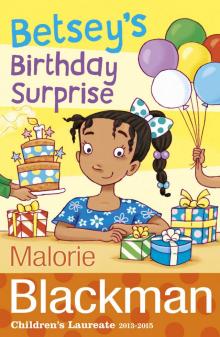 Betsey’s Birthday Surprise
Betsey’s Birthday Surprise Dead Gorgeous
Dead Gorgeous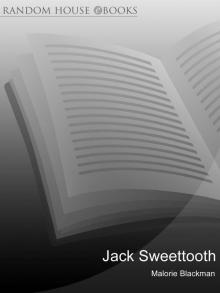 Jack Sweettooth
Jack Sweettooth Crossfire
Crossfire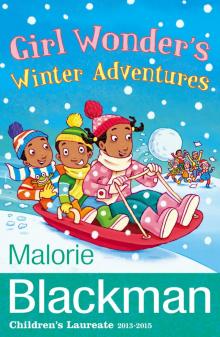 Girl Wonder's Winter Adventures
Girl Wonder's Winter Adventures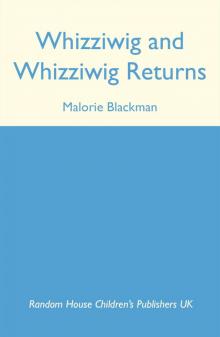 Whizziwig and Whizziwig Returns Omnibus
Whizziwig and Whizziwig Returns Omnibus Double Cross
Double Cross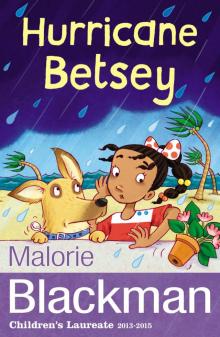 Hurricane Betsey
Hurricane Betsey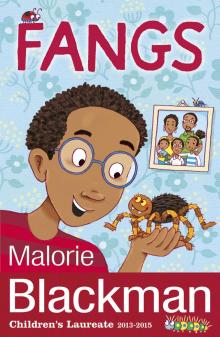 Fangs
Fangs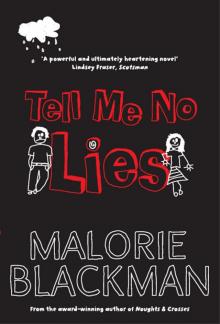 Tell Me No Lies
Tell Me No Lies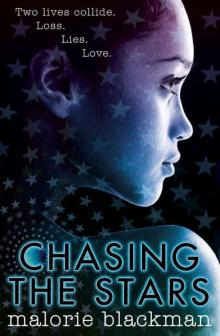 Chasing the Stars
Chasing the Stars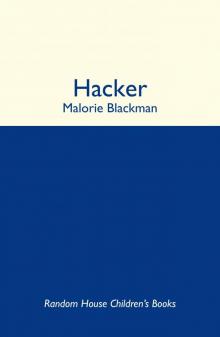 Hacker
Hacker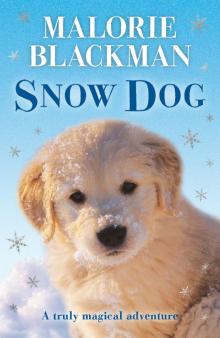 Snow Dog
Snow Dog A Dangerous Game
A Dangerous Game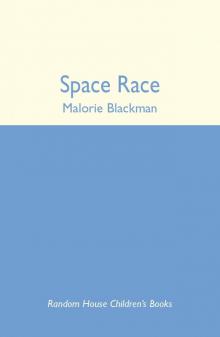 Space Race
Space Race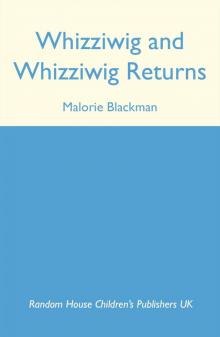 Whizziwig and Whizziwig Returns
Whizziwig and Whizziwig Returns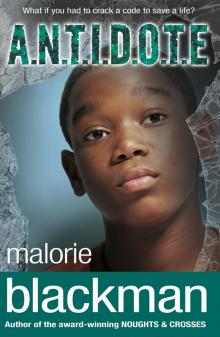 A. N. T. I. D. O. T. E.
A. N. T. I. D. O. T. E.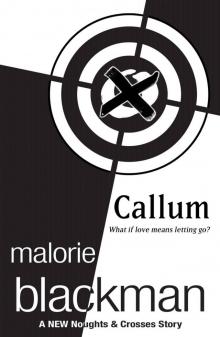 Callum: A Noughts and Crosses Short Story
Callum: A Noughts and Crosses Short Story